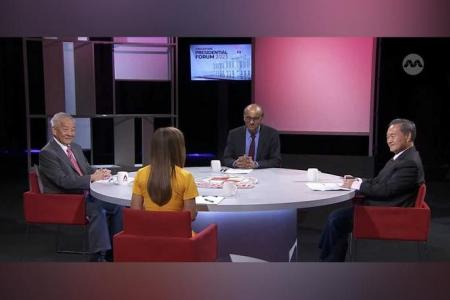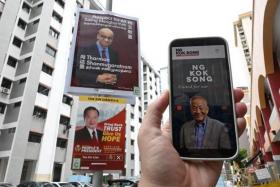Presidential candidates discuss reserves, independence and unifying Singaporeans
The three candidates in the race to be Singapore’s next president spent an hour on Monday night discussing the use of the nation’s reserves, their independence, and how they would unify the nation and navigate the future, often citing their career and experience to bolster their points.
The three candidates in the race to be Singapore’s next president spent an hour on Monday night discussing the use of the nation’s reserves, their independence, and how they would unify the nation and navigate the future, often citing their career and experience to bolster their points.
Former GIC chief investment officer Ng Kok Song, 75; former senior minister Tharman Shanmugaratnam, 66; and former NTUC Income chief Tan Kin Lian, 75, were speaking at a live forum aired on CNA, which began with an explanation on what the elected president can and cannot do.
The session kicked off with two minutes per person to answer a question on what would make them the most qualified candidate.
Mr Ng said he offered three qualifications – competence and experience from his time at GIC and the Monetary Authority of Singapore, his non-partisan status, and his being a person of trust and responsibility.
Mr Tharman said that while he respected his fellow candidates’ strengths, neither of them brings “the breadth and depth of experience that I have”.
He cited his experience internationally across various fields including pandemic preparedness and human development, as well as his experience in government and extensive experience with the reserves: “Put quite simply, I know the whole system of safeguarding and using the reserves inside out. No one can fool me.”
Mr Tan pointed to his 30 years as chief executive of NTUC Income.
He said he was responsible for overseeing the investment of the insurance fund, which is relevant experience for safeguarding the reserves; and had to appoint senior people to the top levels of management.
Asked what factors they would consider before unlocking the past reserves, Mr Tharman said the president must be able to understand the nature of the crisis.
He must also consider if the money is spent wisely and distributed fairly.
Mr Tan said he would consider if the use of the reserves is in the interest of the people, and whether it is a proper use of the reserves.
Mr Ng said he would ask about the total size of the reserves, the assumptions that the Government was making regarding the crisis, and if the Government had exhausted the possibility of raising revenues from elsewhere.
Politicising the election, representing Singapore internationally
The moderator, Ms Otelli Edwards, then asked how they would convince voters they are not politicising the election, and will exercise powers without fear or favour.
Mr Tan said he did not believe in politicking, which would take away time from understanding and solving the problems at hand, such as the low birth rate.
“We should focus on the problem, and use all available resources and knowledge, to see what is the best way to solve the problem.”
Mr Ng reiterated that he does not belong to any political party.
“There’s no better safeguard to have a non-politicised presidential election, (than) to have candidates who do not have any political affiliations,” he said.
Mr Tharman, who answered the question last, said he wanted to “avoid simple labels”.
He said candidates should be assessed on their character, whether they have a spine, their track record, and whether they can keep the trust of the people electing them.
Going by labels of having been a member of a political party is “extremely simplistic” and would rule out past presidents like Mr Ong Teng Cheong and Dr Tony Tan, as well as former presidential candidate Tan Cheng Bock, he said.
Asked what unique traits they had to help them represent Singapore globally, Mr Ng said he had travelled extensively while at GIC, forming friendships with policymakers, businessmen and corporate executives.
Mr Tharman said he would use his international experience to build relationships if elected president.
“But there’s an additional characteristic (and) that has to be the Singapore way and the Singapore voice of reason,” he said.
The Singapore leadership style is to find common ground, respect differences of position and find ways of bridging, he added.
Mr Tan said he had travelled yearly for board meetings and conferences, and took time to understand the culture, history and languages of different countries, even “songs of many languages”.
Unifying Singaporeans, overcoming challenges
On how he would be a unifying figure, beyond the ceremonial and community roles of the president, Mr Ng said he wanted to encourage more interracial help.
He brought up his campaign logo – a hand palm with five fingers meant to signify the various races – and stressed the need to develop empathy for those from other communities.
Mr Tharman said that in the next phase of development, Singapore has to go beyond celebrating diversity and respecting differences, and “become more Singaporean together”.
He added that he would focus on finding common ground in a more diverse democracy.
Mr Tan said the most important factor is that people should feel financially secure and hopeful in their lives. “Then people (have) got more time to think beyond themselves... then they become more unified.”
Asked what major challenges Singapore will face, and how they would help Singaporeans to cope, Mr Tharman highlighted that the world is becoming more divisive.
“We’ve got to create space for Singapore internationally, with both today’s friends as well as those who could be tomorrow’s friends,” he said.
Singapore, he added, also has to start preparing to adapt and respond to climate change. This is a challenge that the president has to be on top of, as the reserves may be required for long-term investments.
Mr Tan said that Singapore has its “own internal problems”, such as being a costly place to live in.
He said the Republic must find ways to bring down the cost of properties, wages and business costs, so that it can be competitive in the world.
Mr Ng said domestically, the challenge is that the younger generation is becoming more cynical and less trusting of government.
The Government has to restore trust among the people, by putting right whatever has gone wrong in terms of its standards of trust and integrity, he said.
While there is external geopolitical conflict, “as long as we stay united as a nation, we will be able to deal with the risks of the international environment”.
When asked what he wanted to tell voters before they head to the polls on Sept 1, Mr Tan said in his closing remarks that in carrying out the constitutional duties of the president, he would examine each recommendation on the use of past reserves and appointment of public service officers critically.
He would use the power of the president to call for a commission of inquiry when needed, to ensure there is transparency and accountability in the Government and public service.
He added that his main concern is for the young people of Singapore, who have to compete for jobs against foreigners and deal with the high cost of living and housing. He would “collaborate and work with the Government to find a better way to solve these problems”.
At this point, the moderator reminded viewers that the president cannot express publicly views on legislation or government policy, without being advised to do so by the Government.
Mr Ng said Singapore needs a president who is competent, experienced and trustworthy, and above all, a president who is non-partisan.
He called on Singaporeans to examine his motivations for joining the race – not for fame or money, but out of a genuine desire to serve his country.
Mr Tharman said he requested “every Singaporean respectfully to vote for me on Friday as a vote for an optimistic future”.
It is easy to be pessimistic when looking at everything happening in the world, or even at happenings in Singapore, he said.
“But when we look at Singaporeans, we become optimistic, when we look at what we’re capable of,” he said, citing national sprinter Shanti Pereira’s sporting achievements and Ms Stephanie Fam, a playwright with cerebral palsy.
“I’ve been serving Singapore my entire life, through public service and even before. You will not get surprises with me. What you see is what you get,” he said, closing off the forum.
Get The New Paper on your phone with the free TNP app. Download from the Apple App Store or Google Play Store now


